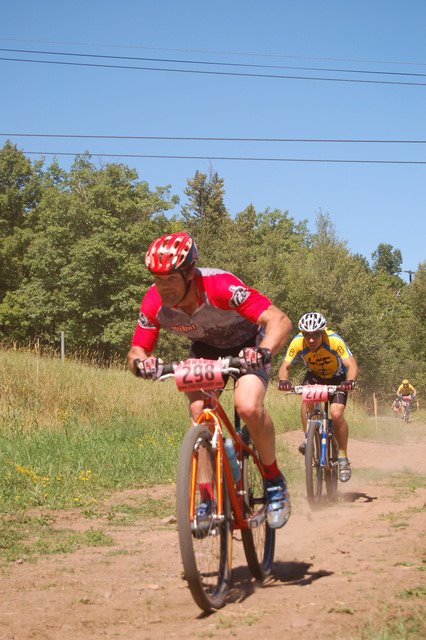Dealing with Post Trans-Iowa Stress Disorder (PTISD).
Norris Hansell famously published his Seven Essential Needs paper in 1967 (later updated to Nine
Attachments in 1973). As a young collegian, some thirty years ago, every one of Norris’ words rang true to me and glowed like
burning coal pouring off of every page, like it was written in my soul from me
to you, Tangled Up in Blue…I digress…Today as I attempt to drag myself
out of my bed each morning and face a post T.I. future, I am once again
comforted by his prose. It is reassuring to think about Norris in the context
of the Trans-Iowa because by applying Hansell’s work to aspects of the
Trans-Iowa one can see why it is such a big deal to finish it and such a big
disappointment to NOT finish it. Firstly
below are the nine generalized “essential
needs” that Hansell maintains each of us must possess in order to
live a “self-actualized” or fulfilled life. Below the generalized list, I apply
the nine essential needs to the Trans-Iowa (TI) in an effort to persuade my
readership that the TI is so important because it complements or follows
Hansell’s key principles.
Hansell’s Nine
ESSENTIAL Needs or CONNECTIONS (in General)
1. TO INFORMATION: Everyone needs access to
facts about himself and his environment to develop innate potential, live in
organized society, maintain mutually fulfilling relationships, and develop a
functional self-concept. Examples are: knowing how to apply for and perform a job,
form and maintain relationships, and take care of oneself physically. All
racers need access to facts about route finding. All racers need access to
information about where to obtain further supplies. All racers need basic
information about battery-life, mileage covered, calories burned etc. All racers need information about the weather
so as to make informed decisions about clothing, fenders, glasses, and a number
of other important factors. The “information” needs of the Trans-Iowa far
exceed any other race that I have participated in. As I found out the hard way, one cannot
simply rely on others to direct one to the finish line. One needs access to
independent information. I really screwed up in this area. My odometer was not working from about the
forty mile mark …no worries until I fell behind a group and was forced to go it
alone…
2. TO A SIGNIFICANT PERSON: Everyone needs an
intimate relationship with at least one other person who is nurturing and
consistently available, such as a mother, teacher, or close friend. No
different down in Iowa. Finishing the
Trans-Iowa for the vast majority of guyz involves teaming up with a partner.
The dynamic duo of the Slender Fungus’ Barre and DBD’s Kershaw is an excellent
example.
3. TO A GROUP: Everyone needs to belong
to a least one group where she is perceived as a member, for example, family,
work, peer group, or social club. Again to be whole, a guy needs to find a
group. My problem this time down in Iowa
was that I could never find the “just-right” group. In the early morning I tried to stay with the
lead group, but got dropped and was forced to ride alone. Then I got picked by
various groups, some were too fast and some were too slow. Or it seemed that if I was feeling good the
pace was to slow and vice versa. The
take-home message is “find a group that fits” and stay with it…I’ve learned my lesson;
I should stayed with the Lonesome Luddite!
4. TO A MEANINGFUL ROLE: Everyone needs to
perform a positive, meaningful function in relation to another person or group,
such as student, foster parent, best friend, citizen, or employee. Same in Iowa, find a role to play.
You could be the navigator, you could be the guy that fixes stuff, you could be
the moral support guy, or the comic relief guy.
The point is that you should not just “sit-in” and take a free ride…it
don’t work that way in life or in Iowa.
5. TO A MEANS OF SUPPORT: Everyone needs assured
access to money which will provide an adequate standard of living. Basic needs are met first through the
provision of family support, then later through independent means, such as gaining
vocational training which can lead to a job. Bring money to Iowa.
6. TO A SOURCE OF JOY: Everyone needs
opportunities to experience joy and happiness, such as participating in
traditional holiday rituals, vacations, and play. This is a very special event
put on by a very extraordinary guy…Race this thing in a state of wonderment and
awe. I forgot this important “need” and instead
lapsed into a downward spiraling dark place full of demonic whiners,
complainers, and nerd-do-wells.
7. TO A SYSTEM OF VALUES AND MORALS: Everyone needs a value
system on which to base decision-making and to give life meaning, as provided
by a religious affiliation, personal philosophy, etc. Clarity through suffering
is why I do these things.
8. HISTORY: Everyone needs personal
heritage, or “roots,” to provide important information about identity,
well-being, and ethnicity. These family
ties are represented and rekindled through the family tree, photo albums,
heirlooms, clan symbols, national flags, personal or cultural heroes, and
international ties. This race has the history!
9. PLACE: Everyone needs an
attachment to geographic locals and places with special meaning. People tend to
identify themselves by where they grew up, where they’ve been, and where they
live now. Examples are: a farmer’s attachment to the land; a
sportsman’s desire to be in the wilderness; or a city dweller’s loyalty to a
neighborhood. This one was a beauty…Bravo Guitar Ted
REFERENCES: Hansell, N. (1974). The Cyclist-in-distress:
On the biosocial mechanisms of adaptation. New York: Behavioral Sciences Press.



